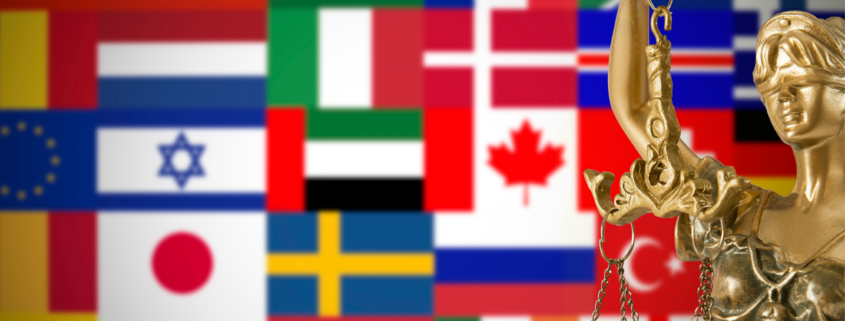Hague Convention: World Day of International Justice
On July 17th, the world unites to celebrate World Day for International Justice. The day also highlights important topics such as The Hague Convention in upholding justice on a global scale. Let’s take a deeper look at what today signifies.
The Hague Convention on Civil Aspects of International Child Abduction (“The Hague Convention”) is vital for resolving cross-border legal disputes involving minors and maintaining harmonious international relations. Today, we explore the significance of the Hague Convention and its impact on promoting justice worldwide. Here’s what you need to know.
Understanding the Hague Convention
The Hague Convention of 25 October 1980 on the Civil Aspects of International Child Abduction (1980 Hague Convention) is a multilateral treaty that establishes proceedings for the prompt return of children who have been wrongfully removed or kept away from their home country. Currently, there are 101 Contracting States to the Hague Convention. Including the United States.
Promoting Family Law Cooperation
The Hague Convention promotes cooperation among diverse legal systems, particularly international family law. Recognizing the complexities that can arise in cross-border family disputes, the Convention actively encourages member countries to establish effective communication channels, exchange relevant information, and engage in meaningful cooperation.
Through cooperation, the Convention facilitates the sharing of expertise, best practices, and legal frameworks among member countries. This knowledge-sharing helps bridge gaps in understanding and cultural differences, leading to a more effective and culturally sensitive resolution in cross-border family law cases. It recognizes the importance of safeguarding the rights and interests of families, promoting stability, and minimizing potential harm.
The Hague Convention ultimately contributes to the overarching goal of international justice. By facilitating fair and efficient resolution of cross-border family disputes, the Convention upholds the principles of fairness, equality, and protection of individual rights. It seeks to establish a framework that respects diverse legal systems while working towards common goals and shared values.
Understanding Family Law Limitations
The Hague Convention, while comprehensive in its scope, may encounter limitations when applied in practice. Each case is unique, and complexities can arise due to cultural differences and interpretation of the Convention’s provisions. These challenges can affect the process and outcome of international cases, underscoring the importance of seeking legal advice.
To effectively navigate these obstacles and achieve the best possible outcomes in international family law cases, seeking guidance from legal professionals well-versed in international family law becomes crucial. Legal professionals experienced in international family law possess the expertise and knowledge necessary to navigate the complexities of the Hague Convention. They can provide valuable guidance on interpreting and applying the Convention’s provisions, helping individuals involved in international divorce cases understand their rights and obligations.
Recognition and Enforcement of Judgments
In an increasingly interconnected world, the recognition and enforcement of foreign judgments play a critical role in upholding the rule of law. The Hague Convention ensures that court judgments rendered in one jurisdiction are duly recognized and enforced in another. The Hague Convention is a robust framework for identifying and enforcing foreign judgments. It provides a mechanism through which decisions issued in one country can be acknowledged and given effect in another jurisdiction. This harmonization of recognition and enforcement procedures helps to streamline legal processes, reducing delays and uncertainties that could hinder international transactions.
By recognizing and enforcing foreign judgments, the Convention fosters trust and confidence among nations. It ensures that individuals can rely on the judicial outcomes obtained in one jurisdiction when operating across borders. This promotes legal certainty, reduces the risk of duplicative proceedings, and facilitates the smooth flow of commerce and investments between countries.
Initiating the Process
Deciding whether to file a Hague application is an important decision and must be considered based on each case’s specific circumstances. Perhaps after separating from their partner, a parent wants to take their child and move to another country. Maybe a parent moved internationally in violation of a custody agreement.
Filing a case under the Convention does not guarantee that your child will be returned. To obtain the return of your child through a Hague proceeding, you must first be able to demonstrate the following:
- That your child was habitually resident in one Convention country and was wrongfully removed to or retained in another Convention country;
- The removal or retention of your child is considered wrongful if it was in violation of your custodial rights, and you were exercising those rights at the time of the removal or retention, or you would have been exercising them but for the removal or retention.
- The Convention must have been in force between the two countries when the wrongful removal or retention occurred (the dates are different for every country); (Note: In many instances, when a country accedes to the Convention, it is not automatically partners with all of the other countries who have ratified or acceded to the Convention. Countries must accept another country’s accession to the Convention under the terms described in the Convention before a treaty partnership is created.
- The child is under the age of 16.
U.S Legal Resources
- International Child Abduction Remedies Act – establishes procedures in the United States to implement the Hague Convention
- International Parental Kidnapping Crime Act – makes it a federal felony offense in the United States to remove, or attempt to remove, a child under the age of 16 from the United States with the intent to obstruct the lawful exercise of parental rights
- Uniform Child Abduction Prevention Act – provides guidance to U.S. courts on custody disputes and divorce proceedings to protect against family abductions
- Uniform Child Custody Jurisdiction and Enforcement Act – establishes clear bases for jurisdiction and discourages competing child custody orders
Why Choose Masters Law Group?
International custody issues can be incredibly difficult to deal with as a parent because of the concern you have for the safety and security of your child, and should be handled properly by a knowledgeable attorney.
Erin Masters and Anthony Joseph have extensive experience in cases involving international child custody disputes and parental abductions in both courts located in the State of Illinois and the United States federal court system.
Read the details of our most recent successful Hague Convention cases below. Furthermore, see what our clients have to say on representing their Hague Convention on Civil Aspects of International Child Abduction case:
I had a very difficult case in the United States Federal Court. My ex husband filed a Petition against me under the Hague Convention on Civil Aspects of International Child abduction asking to return our two sons to Lithuania. Seeking for the legal representation, I was advised by the U.S. Department of State to contact lawyer Erin E. Masters. I was so lucky to have the team of the best lawyers Erin E. Masters and Anthony G. Joseph representing me in this difficult trial.
They represented with the highest standards of law, but also provided support and empathy through the process. The communication was fantastic, always answered every question, explained every situation and possible outcome. As it was a very fast track case, Erin and Anthony worked hard including weekends to prepare everything for the hearing. There was only one hearing and the Decision was totally in my favor. All my family, especially the kids, are very grateful! It is also fair to mention that the legal expenses for the amount of services provided was very very reasonable.
I will gladly recommend Erin Masters and Anthony Joseph to represent any of my friends and family in need of an excellent and highly professional family attorney.
— Aistė Šulcaitė
Final Thoughts
As we commemorate World Day for International Justice, we must acknowledge the ongoing efforts toward establishing a just framework. Rather than grappling with complex international law issues alone, seeking professional guidance is highly recommended in these time-critical cases. If you need legal assistance in Cook County or DuPage County, Illinois, look no further than Masters Law Group. Our experienced team is dedicated to guiding you through the intricate legal landscape of international law to provide robust representation in these challenging and high-stakes proceedings.
Featured Hague Decisions:











